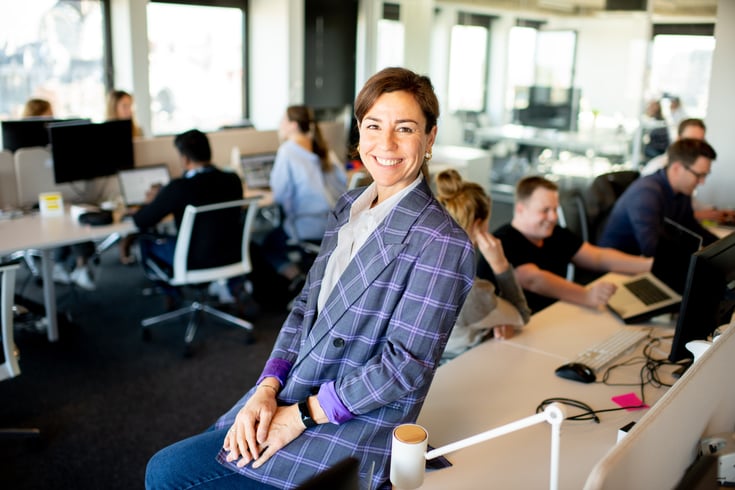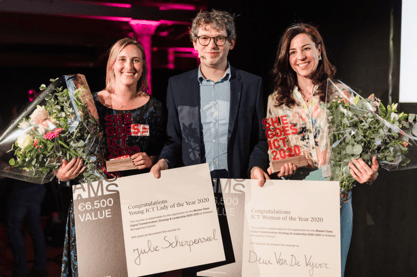If anyone is still shrugging off the idea that we need more women in ICT, just let them have a chat with Dewi Van De Vyver. Five minutes into the conversation and they will be convinced that we are not doing nearly enough to engage women in ICT and tech. No wonder DataNews honored her with the ICT Woman of the Year Award in 2020. Thanks to this recognition, she got the opportunity to spread her much-needed message on a wider scale. And, as part of the Award, she also got to participate in the AMS Master Class Digital Transformation, Strategy & Leadership. Time to find out if we are on the right track to close the STEM gap!

Dewi Van De Vyver started out as a communication officer but eventually decided to act on her lifelong passion for ICT and make a career change. Nowadays, she is CEO of Flow Pilots, a company that designs, tests and develops digital solutions. She has not forgotten about her other passion, though: championing for women’s equal participation and leadership in public life. Because if we want more women in ICT, that’s where it starts.
There have been quite a number of campaigns for women in STEM, but without much success so far, why do you think that is?
Well, you can’t expect girls to suddenly choose STEM education or STEM careers if they have been brought up with the knights & princesses stereotypes all their lives. Gender bias is still very much present throughout society, creating a vicious circle that is very hard to break. What we need, is to bring in a new perspective in everything we do. In technology or in medical science for instance, we still see a lot of products entering the market without even being tested on women. Car crash test dummies, to name but one, are practically all modeled on male bodies. These practices are not being questioned because too few women are involved in creating those products. But then, if all you see around you is a male perspective, why, as a young woman, would you even think of entering a STEM career and start designing technology yourself?
That applies even more to IT?
Yes, IT is still very much considered to be the sole domain of hard-core IT nerds, so to speak. But what we keep forgetting is that digital technology is being integrated in all aspects of our lives and in all sorts of jobs. Working in the healthcare industry, for instance, is still considered to be a soft job, but nowadays, there is a lot of technology involved. So we really should be starting to integrate IT in all training programs, including healthcare, teacher training, etc. And the IT industry should start to involve people in the so-called soft jobs in the design and development of technological solutions. Because after all, innovation should be driven by the people on the floor; they are the ones who know best what they need.
In this way, the AMS Master Class Digital Transformation that sets out to align business and IT is a good move?
Yes, the Master Class clearly illustrates how business works, and how IT works. They are separate worlds that are driven by their own logic, and you need to be aware of that. That is why a successful digital transformation is so hard to achieve. Companies still tend to make digital transformation the responsibility of the IT department, whereas it goes way beyond that. The Master Class shows you step by step how you can align business and IT and how to achieve a true digital transformation. It really put into words and theories what I had been feeling intuitively all along. Personally, I would take the Master Class even one step further and bring in the perspective of the end user too. When you start a digital transformation, you should always define your end users, whether they are employees or customers, and take their journey into account when you are setting your goals.

Are there any other ways in which AMS can help close the STEM gap?
As a business school, AMS is literally building the managers of the future. So it’s key to ask yourself how those managers should interact with the world, what type of leadership do we need, what values are important? Especially in the VUCA world we live in, it’s tempting to just go with what you dó know, with the familiar things you see around you, instead of questioning the status quo. Many CEOs today feel they are putting in quite a lot of effort already when it comes to gender equality, but their perception is based on their own situation. They really should be putting themselves in the shoes of women employees. Because when it comes down to it, women are still expected to run the household while giving it their all at work. Men may take on the morning shift, getting the children ready for school, for instance, but in most cases, it is still mom who makes sure the shopping is done and the laundry is ready so that dad can make the lunch box and pack the gym bag. Likewise, it’s still more acceptable for men than for women to attend networking events or follow a master class at night.
So combining the Master Class with your job and family life wasn’t always easy?
No, that’s why I actually welcomed the fact that the Master Class had to be moved online because of the coronavirus crisis. Of course, some things, such as networking events, are hard to be replaced by digital alternatives. But doing a case study with two fellow participants can just as well be done online. Plus, it makes it a lot easier to combine study and family life. You just all take a break when it’s time to put the children to bed and carry on working together afterwards. So I’m hoping that AMS will continue to combine online and face-to-face learning in post-corona times. That is certainly one very concrete way to make lifelong learning more feasible.
What are the key takeaways then, if we want to make sure more women choose an IT career path?
We need to be aware that, despite all efforts, there is still a lot of unconscious bias, from an early age onward. If we want to break the vicious circle, we need to work on that together: parents, education, companies, policymakers and society, women ánd men. Only by listening to each other and keeping an open mind, can we start making a difference.




